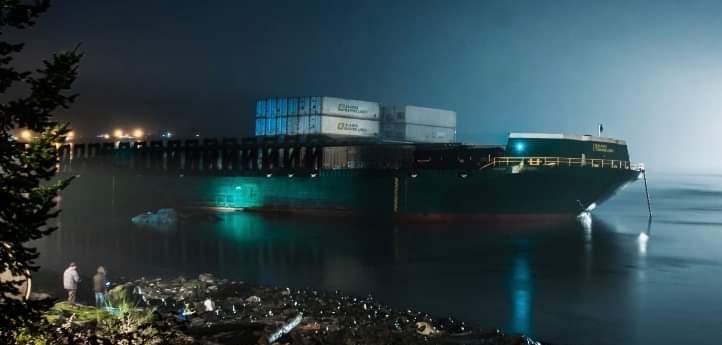The Wei Wai Kum First Nation is not happy with how the removal of a grounded barge was handled.
It’s citing a lack of consultation by both Transport Canada and Canadian Coast Guard.
The Nana Provider has been in the area since Nov. 9, when it ran aground near Quadra Island.
The barge was moved to Duncan Bay this past Friday.
“From the Wei Wai Kum Nation perspective, we are deeply disappointed with the lack of opportunities provided to us and other affected First Nations to participate in planning and decision making related to this unfortunate marine incident,” said Wei Wai Kum Chief Councillor Chris Roberts.
“While we are all relieved that the barge was safely re-floated early (last) weekend with minimal apparent environmental damage, the dismissal of First Nation requests for involvement in such a high-profile marine incident in our traditional territory is unacceptable. We would have expected much more, given the focus of Canada’s Ocean Protection Plan on First Nation reconciliation and a strengthened role in incident response by First Nations.”
The barge became separated from its U.S.-registered tugboat Polar King and ran aground on a shallow reef adjacent to Quadra Island.
The barge was carrying rail cars and cargo containers from Seattle to Alaska.
A Wei Wai Kum guardian boat visited the Coast Guard vessel at the incident site the following day to ask for information and to provide contact information.
The Wei Wai Kum Nation said that reportedly, the incident was not considered a pollution event, “and therefore not considered subject to an incident response plan being developed for North Vancouver Island.”
“Some Wei Wai Kum administration staff did receive a minimal email notice from Coast Guard about the incident, however, a more formal notification and engagement with the First Nation’s leadership is expected and would have been appreciated,” the nation said in a release.
A day later, Coast Guard confirmed that one rail car contained compressed CO-2 while the other two contained a corrosion inhibitor.
“The U.S operator stated, however, that there was no danger to Quadra Island residents due to the absence of petroleum products on board. While we are happy that risk to residents was determined low, it is concerning that no consideration of marine ecosystem impacts was apparent, given the significant value and dependence of First Nations on marine ecosystem health,” Wei Wai Kum Nation said.
Transport Canada also stated that a plan was put together by the owner to refloat the barge and tow it to a dock in Duncan Bay to assess the damage and make repairs.
The Campbell River lifeboat station was identified to monitor the refloating operation and a Transport Canada inspector to inspect the barge once it was anchored.
The Wei Wai Kum said it is “disappointing” that its guardians were not offered a role in monitoring the refloating operation in its territory, or reviewing the salvage plan and its decision on where to take the disabled barge.
“We have put considerable effort into strengthening our guardian capacity and role, to address obvious deficiencies in government monitoring of marine activities. In addition, one of the projects recently completed by our Nation under the Oceans Protection Plan was the identification of ‘areas of concern’ to be provided to Coast Guard in the event of a marine incident, to ensure they are a priority for protection,” the Nation said.
“The salvage plan (developed without our participation) unilaterally identified one of our areas of concern as the site for relocating the barge.”
Chief Roberts said, “We intend to use our experiences in the Nana Provider to increase the scope of marine incident response planning and the role of First Nations in incident response.”
He added that, “similar to the outcome of the grounding of the Nathan E. Stewart in Heiltsuk territory, we expect the obvious deficiencies in First Nation participation in the Nana Provider incident to result in positive changes that will increase our ability to protect marine resources and communities in any future incident.”
We have reached out to Transport Canada and the Canadian Coast Guard for comment.






